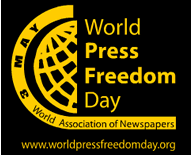Held on : 3rd May
 Freedom of The Press consists of Constitutional or Statutory Protections pertaining to the media and published materials. The Universal Declaration of Human Rights states: "Everyone has the right to freedom of opinion and expression; this right includes freedom to hold opinions without interference, and impart information and ideas through any media regardless of frontiers" This philosophy is usually accompanied by legislation ensuring various degrees of freedom of scientific research (known as scientific freedom), publishing, press and printing the depth to which these laws are entrenched in a country's legal system can go as far down as its constitution. World Press Freedom Day is annually observed on May 3 to inform the international community that freedom of the press and freedom of expression are fundamental human rights. This day reminds people that many journalists brave death or face jail to bring daily news to the public.
Freedom of The Press consists of Constitutional or Statutory Protections pertaining to the media and published materials. The Universal Declaration of Human Rights states: "Everyone has the right to freedom of opinion and expression; this right includes freedom to hold opinions without interference, and impart information and ideas through any media regardless of frontiers" This philosophy is usually accompanied by legislation ensuring various degrees of freedom of scientific research (known as scientific freedom), publishing, press and printing the depth to which these laws are entrenched in a country's legal system can go as far down as its constitution. World Press Freedom Day is annually observed on May 3 to inform the international community that freedom of the press and freedom of expression are fundamental human rights. This day reminds people that many journalists brave death or face jail to bring daily news to the public.
World Press Freedom Day was established by the General Assembly of the United Nations in December 1993 as an outgrowth of the Seminar on Promoting an Independent and Pluralistic African Press. This seminar took place in Namibia in 1991 and led to the adoption of the Windhoek Declaration on Promoting Independent and Pluralistic Media. The Windhoek Declaration called to establish, maintain and foster an independent, pluralistic and free press. It emphasized the importance of a free press for developing and maintaining democracy in a nation, and for economic development. World Press Freedom Day is celebrated annually on May 3, the date on which the Windhoek Declaration was adopted.
Although World Press Freedom Day has only been celebrated since 1993, it has much deeper roots in the United Nations. Article 19 of the 1948 Universal Declaration on Human Rights states that everyone “has the right to freedom of opinion and expression; this right includes freedom to hold opinions without interference and to seek, receive and impart information and ideas through any media and regardless of frontiers". Each year since 1997, the UNESCO/Guillermo Cano World Press Freedom Prize is awarded to honour the work of an individual or an organization defending or promoting freedom of expression, especially if it puts the individual’s life at risk. The Prize is named in honour of Guillermo Cano Isaza, a Colombian journalist who was assassinated in front of the offices of his newspaper, El Espectador, in Bogotá, on 17 December 1986. Cano's writings had offended Colombia's powerful drug barons. Last year it was awarded posthumously to a Russian investigative reporter, who was murdered in a contract-style killing in 2006.
World Press Freedom Day gives people the chance to pay tribute to media professionals who risked or lost their lives in the line of duty. Many communities, organizations and individuals take part in this day through various events such as art exhibitions, dinners featuring keynote speakers, and awards nights to honor those who risked their lives to bring news to the world. UNESCO also marks World Press Freedom Day each year by bringing together media professionals, press freedom organisations and UN agencies to assess the state of press freedom worldwide and discuss solutions for addressing challenges. Each conference is centred around a theme related to press freedom, including good governance, media coverage of terrorism, impunity and the role of media in post-conflict countries.
Holiday Status - It is not a Public Holiday
